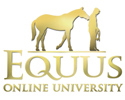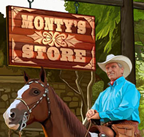Do mustangs "think" differently, or has domesticity diffused (dulled) the mustang thought patterns?
I just got a 14 year old mustang (out of the Virginia City herds). He was taken at age 4, and had about 8 years as a ranch horse, and the last 1 1/2 years as a pampered domestic riding pet for a completely untrained "husband" -- which is how I got him -- he was proving to be "too much" for that poor vibrantly emerald green spouse.
I chose him because of the look behind his eyes.... Intensely aware. I would not call him "reactive" but NOTHING slips by this guy. Every single outside stimulus is observed, weighed, stored.
Monty, I have Shy Boy (as an audio tape -- which to me was THE best way to hear your story with him -- phenomenal experience), and am following your lessons.
...I want to get inside this guy's head. I want to know HOW he's thinking, not just "why". I don't want to correct him for something that's perfectly appropriate in his world view -- I want to understand WHY he's doing what he's doing, and how to communicate to HIM with my behavior, to modify his behaviors to something that fits us both.
Do you have anything that I can read (or better yet, LISTEN to)that will help me understand how his brain works? Can you recommend any "specific" audio commentaries, video lessons, writings of yours?
I want to step into his world on the right foot, and set him up for success from the get-go.




Hello Beck!
It sounds very good to me that you want to go the right way to give your mustang good experiences. I have no experience with mustangs, I am working with a 16 year old Norwegian since September last year. But what Monty points out is that Equus is a global language, there are no horses who cannot speak their own language. It seems to me as if they are not even able to ignore it when you talk to them.
So, I would advise you to work strictly with Montys videos. For me that is the best way to learn, because you are for example able to watch it again and again, as often you need to. You can hear it AND you can see it, all his gestures and all the horses' reactions.
Why he is doing the things he does is an easy question. You said that he has been living in a herd of mustangs for about four years. And that is the key. He was living freely, but he had to be observing, because nature is not always safe. And he is doing all those things because of learned behaviours. You will see he will also study your behaviours, so he is able to assess several situations. He will learn that you want to do the same every horse wants; you want to do everyting the right way and do not want to be punished for things you think you did the right way. Hope you'll soon become friends. Looking forward to hearing from you!
Jasmin
Beck, I have a friend who got a mustang to ride endurance with when her Arab was getting older. One, the mare had feet like rocks and a ton of natural stamina. She also noted that when asked to take a certain line on the trail and she wasn't comfortable with it she would give the mare her head and she would choose her own line and it was indeed the better way to go. She learned it first when crossing rivers or streams. She would stop and then pick her own crossing. Four years with a herd had taught her many safety lessons and how to interperet her surroundings. They have remarkabke skills and haved learned them "intrinsicly" just like Monty's training. Also ground work will enable him to earn your trust. He needs to learn your laungage as well as you have to learn his.
Thank you both for your insights!
One thing I think I'm seeing is that he is looking for leadership. The last owner had little knowledge, and even LESS confidence. I feel a lot of uncertainty through his body language while I'm in the saddle. ...Now, I know dogs a lot better than horses -- but I think that when it comes to the need to know they can trust a leader, that they have a lot in common. This mustang doesn't feel like he "wants" to lead, but that because of his last owner being so green, that the horse had to "become" the leader -- and it makes him uncomfortable. Like a non-alpha dog who's put in the position of needing to lead -- there's fear, there's uncertainty.
My first goal, I think, will to keep things kindergarten simple and clear for him so that he can start to relax into the comfort of knowing that he can give his trust over to me. PICNIC, as Monty says. And, for my part KISS (Keep It Simple, Stupid!).
I need to become his "lead mare."
Thanks again, and please keep your ideas and insights coming!